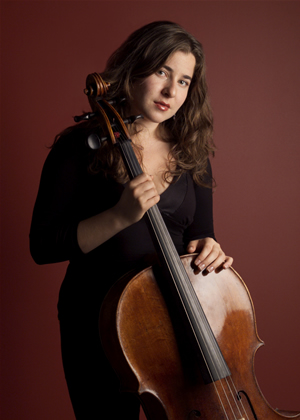Dvořák Fest offers another impressive CSO debut and a magnificent Eighth Symphony

The Chicago Symphony Orchestra’s Dvořák Festival continued Wednesday night with part deux, serving up another notable debut by a young female string soloist, as well as making increasingly manifest the superb musical partnership of conductor Sir Mark Elder and the orchestra.
Following Janine Jansen’s blazing performance of Dvořák’s Violin Concerto last week, this time it was the turn of 27-year-old Alisa Weilerstein in the spotlight with the Czech composer’s beloved Cello Concerto.
The most-performed cello concerto in the repertoire and one of Dvořák’s familiar warhorses, this late work is hardly a neglected curio. But Weilerstein brought a lyric freshness, spontaneity and sensitivity to this music that made her performance memorable.
Weilerstein is an impulsive performer and Wednesday night at times sacrificed intonation and polish a bit too much in the heat of the moment. The tradeoff was her improvisatory spark and the deep reservoir of feeling. Rarely will one hear a less hackneyed rendering of the first movement’s main theme, with Weilerstein bestowing a quiet inner glow, or the rapt delicacy of her playing in the Adagio. In the resolute finale, there was some fleeting miscoordination between soloist and orchestra, but the ruminative final soliloquy was performed with an otherwordly serenity and sense of the music’s deep melancholy.
Elder’s partnership with the CSO is growing tighter and stronger with each program, as was made clear by the magnificent performance of the Symphony No. 8, which provided the high point of the festival to date. One of the striking qualities of Dvořák’s music is that even with such a reservoir of indelible melodies, his music never descends to mere tune-spinning or cheap sentiment, with a toughness and fiber that keeps a taut dramatic edge.
Elder and the CSO deftly balanced those elements in the crackling performance of the Eighth, with the bucolic nature elements given plenty of room to breathe without sacrificing the drama, as with the sheer visceral excitement of the brassy coda. Terrific playing in all sections, with special note of Mathieu Dufour, who, even on a busy night with many spotlit passages, still managed to throw off the finale’s flute solo at lightning speed without a hint of breathlessness.
Elder had said that one reason for doing a festival such as this is to hear infrequently performed works, and Wednesday brought us a genuine rarity with the overture, In Nature’s Realm. Dvořák had originally intended the work as the opening section of a triptych entitled “Nature, Life and Love,” along with the Carnival and Othello overtures. The immediate success of the rousing Carnival Overture put the other two works in the shadows (and it would truly have been a bizarre centerpiece to be followed by the dark and dour Othello).
In Nature’s Realm has some of the pastoral charm of Dvořák’s best works as well as a not-too-intense drama. But it’s easy to see why this piece has never found great favor, being rather prolix at fifteen minutes for its unimposing ideas, along with a quiet coda compared to the thrilling Carnival. Still, it was fascinating to hear this rarity, which enhances our view of Dvořák’s oeuvre, and was given taut and forceful advocacy by Elder and the orchestra.
The program will be repeated 8 p.m. Thursday night. Alisa Weilerstein will also perform the Dvořák Cello Concerto 8 p.m. June 19 in a program featuring the Carnival Overture and the Symphony No. 9. 312-294-3000; www.cso.org
Posted in Uncategorized




